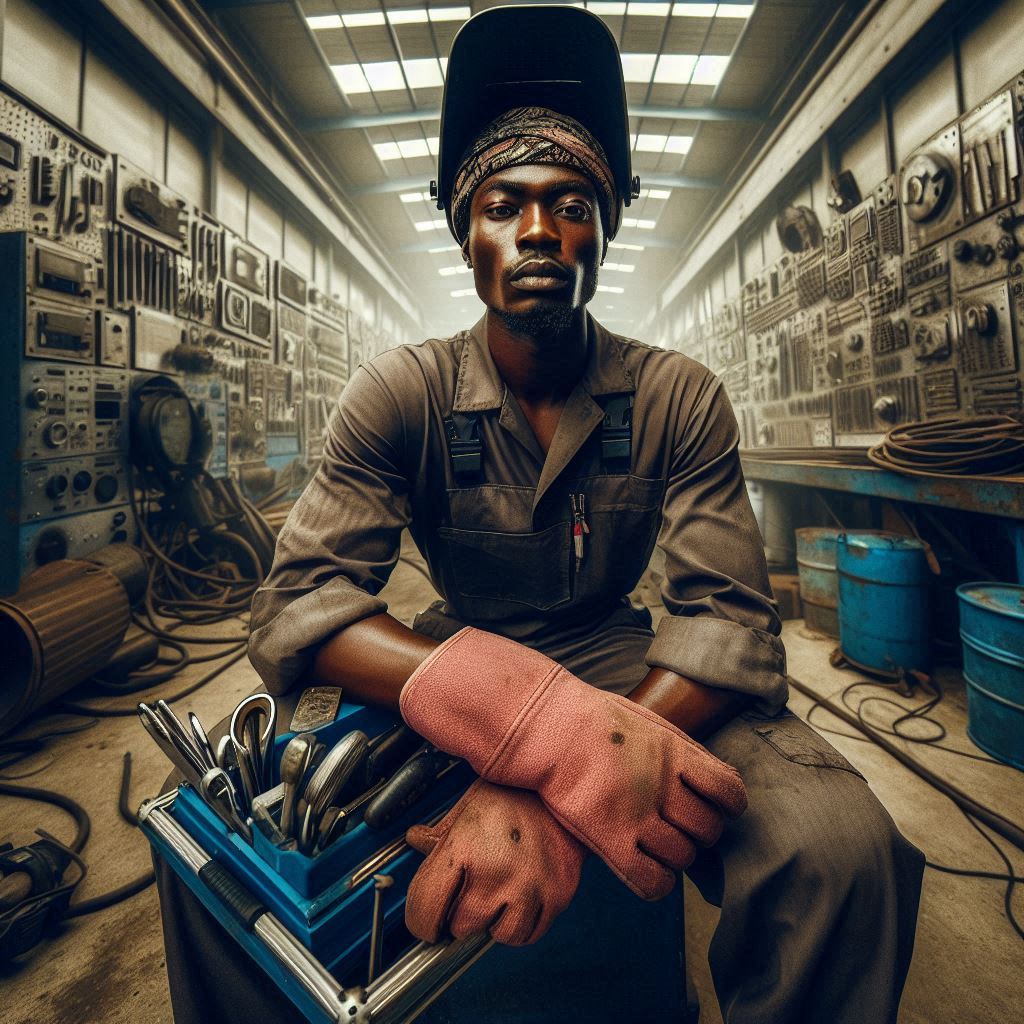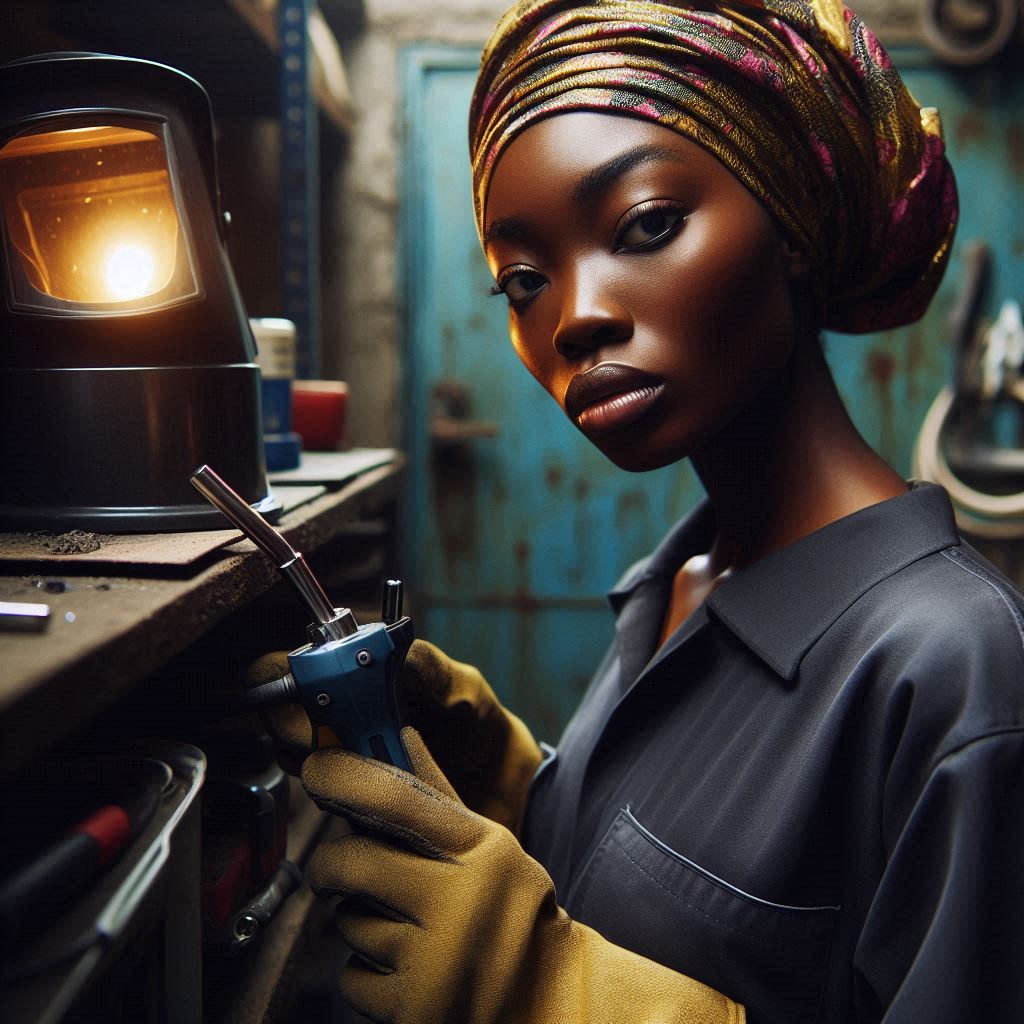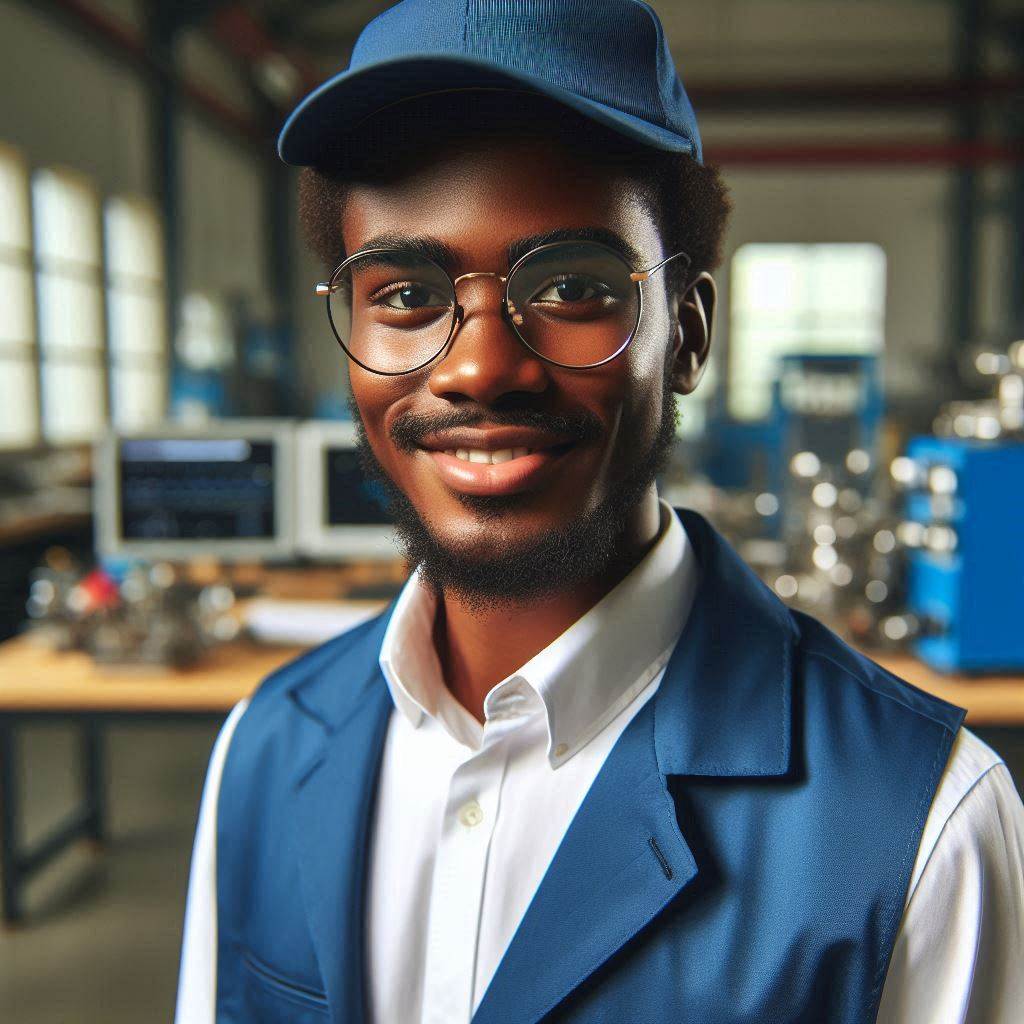Introduction
Women in Aerospace Engineering in Nigeria are making notable strides in a male-dominated industry, breaking barriers and reshaping the field.
Nigeria’s aerospace engineering industry is relatively young but rapidly growing, with advancements in technology and a desire to compete globally.
Women bring diverse perspectives and skills to STEM fields, including aerospace engineering, fostering innovation and driving progress in the industry.
Despite facing challenges such as gender bias and stereotypes, women in Nigeria are increasingly joining the aerospace engineering workforce and making impactful contributions.
Women in Aerospace Engineering Nigeria
Brief Overview of the Aerospace Engineering Industry in Nigeria
Nigeria’s aerospace engineering industry is rapidly growing. Several initiatives are fostering advancements in aviation and space technology.
Nigerian universities offer aerospace engineering programs, producing skilled graduates annually. The National Space Research and Development Agency (NASRDA) spearheads Nigeria’s space ambitions.
Additionally, private sector companies contribute to the industry’s growth. Collaborative efforts with international organizations enhance Nigeria’s aerospace capabilities.
Government policies support research, development, and innovation in aerospace technology. Investment in infrastructure further strengthens the industry’s foundation. Nigeria aims to become a key player in global aerospace engineering.
Importance of Women in STEM Fields
Women’s participation in STEM fields is crucial. Diverse perspectives drive innovation and creativity. Gender diversity enhances problem-solving and decision-making processes.
Women bring unique insights and skills to the table. Promoting women in STEM fields addresses gender inequality. Encouraging girls to pursue STEM careers broadens their opportunities.
Female role models inspire the next generation of scientists and engineers. Supporting women in STEM creates a more inclusive workforce.
It also helps bridge the gender gap in high-paying technical jobs. Women’s involvement in STEM is essential for sustainable development.
Benefits of Women in STEM
- Diverse perspectives
- Enhanced problem-solving
- Gender equality
- Inspiring role models
- Inclusive workforce
Transition into the Role of Women in Aerospace Engineering
Women in aerospace engineering face unique challenges. However, their contributions are vital for the industry’s progress. Increasing the number of women in aerospace boosts innovation.
Female aerospace engineers excel in various roles and specializations. They contribute to research, design, development, and operations. Women lead groundbreaking projects and mentor young engineers.
Their participation promotes gender balance and inclusivity. Support networks and professional organizations empower women in aerospace. Initiatives and scholarships encourage girls to study aerospace engineering.
Companies and institutions benefit from diverse engineering teams.
Roles of Women in Aerospace Engineering:
- Research and development
- Design and testing
- Project management
- Mentoring and leadership
Nigeria’s aerospace engineering industry holds great potential. Women’s involvement in this field is essential for innovation and progress.
Encouraging women to pursue aerospace engineering strengthens the industry. Gender diversity brings valuable perspectives and enhances problem-solving.
Support and mentorship are crucial for women’s success in aerospace. Nigeria must continue to promote women in STEM for a brighter future.
With more women in aerospace, the industry will reach new heights. Nigeria’s journey in aerospace engineering will be more inclusive and dynamic.
Challenges Faced by Women in Aerospace Engineering in Nigeria
Women in aerospace engineering in Nigeria face numerous challenges in their career pursuits.
These challenges are often deeply rooted in gender stereotypes, bias in the industry, lack of representation, mentorship, cultural barriers, societal expectations, education, and access to opportunities in STEM fields.
Let’s delve deeper into each of these challenges:
Gender Stereotypes and Bias in the Industry
One of the primary challenges faced by women in aerospace engineering in Nigeria is the prevalence of gender stereotypes and bias in the industry.
These stereotypes and biases often manifest in the form of assumptions about women’s capabilities and competencies in technical fields, including aerospace engineering.
Women are sometimes seen as less competent or knowledgeable, solely based on their gender, which can hinder their career advancement and opportunities.
Lack of Representation and Mentorship for Women
Another significant challenge for women in aerospace engineering in Nigeria is the lack of representation and mentorship in the industry.
Without visible role models and mentors who can guide and support them in their career journeys, women may struggle to navigate the challenges and complexities of the aerospace engineering field.
The absence of representation and mentorship can also contribute to feelings of isolation and imposter syndrome among women in the industry.
Cultural Barriers and Societal Expectations
Cultural barriers and societal expectations also pose challenges for women in aerospace engineering in Nigeria.
In a society where certain professions are considered more suitable for men, women who choose to pursue careers in male-dominated fields like aerospace engineering may face resistance, discrimination, and criticism from their families, communities, and colleagues.
These cultural barriers and societal expectations can create additional hurdles for women in their professional endeavors.
Education and Access to Opportunities for Women in STEM Fields
Access to quality education and opportunities in STEM fields is another challenge for women in aerospace engineering in Nigeria.
Due to various factors such as limited resources, unequal access to educational opportunities, and societal norms that prioritize boys’ education over girls’, women in Nigeria may face barriers to pursuing STEM-related studies and careers.
This lack of education and access to opportunities can hinder women’s progress in aerospace engineering and limit their potential for growth and success in the field.
In fact, women in aerospace engineering in Nigeria encounter several challenges that impede their career advancement and success.
Addressing these challenges requires a multi-faceted approach that involves breaking down gender stereotypes, promoting representation and mentorship for women, challenging cultural barriers and societal expectations, and improving education and access to opportunities in STEM fields.
By creating a more inclusive and supportive environment for women in aerospace engineering, Nigeria can empower talented and aspiring female engineers to thrive and contribute to the industry’s growth and innovation.
Read: Interview with Nigerian Aerospace Engineering Expert
Success Stories of Women in Aerospace Engineering in Nigeria
Meet Jane, a Trailblazer in Aerospace Engineering
Jane is a visionary aerospace engineer in Nigeria who has made significant strides in the industry.
Transform Your Career with Expert Guidance
Get personalized mentorship consulting that’s tailored to your unique path. Our expert advice is actionable and exclusive.
Get StartedShe has been recognized for her innovative contributions to the field, including designing cutting-edge aircraft technologies.
Breaking Barriers and Shaping the Future
Despite facing challenges in a male-dominated industry, Jane has remained resilient and determined to excel.
Her success serves as an inspiration to aspiring female engineers in Nigeria.
Empowering the Next Generation of Women Engineers
Jane actively mentors young women in aerospace engineering, providing them with guidance and support to pursue their dreams.
She aims to foster a more diverse and inclusive workforce in the industry.
Jane’s Impact on Nigeria’s Aerospace Sector
Jane’s innovative work has had a profound impact on Nigeria’s aerospace sector, driving advancements and breakthroughs in technology.
Her expertise and leadership have positioned Nigeria as a key player in the global aerospace industry.
Celebrating Achievements and Recognizing Talent
Jane’s achievements have been celebrated nationally and internationally, highlighting the talent and potential of women in aerospace engineering.
She continues to inspire others with her dedication and passion for the field.
Championing Diversity and Inclusion in Aerospace Engineering
Jane advocates for diversity and inclusion in the aerospace engineering sector, pushing for equal opportunities for women in the industry.
Her efforts have paved the way for more women to thrive in the field.
In essence, women like Jane are reshaping the landscape of aerospace engineering in Nigeria.
Their achievements, contributions, and impact are paving the way for a more diverse and inclusive industry.
Read: Future Prospects for Aerospace Engineering Nigeria
Initiatives and Programs Supporting Women in Aerospace Engineering in Nigeria
Organizations and institutions promoting gender diversity in STEM fields
Several organizations in Nigeria actively promote gender diversity in STEM fields.
These organizations work towards creating a more inclusive environment for women in aerospace engineering.
They offer support, resources, and opportunities for women interested in pursuing careers in this male-dominated field.
Scholarships, mentorship programs, and networking opportunities for women
There are various scholarships available specifically for women in aerospace engineering in Nigeria.
These scholarships help cover the costs of education and training, making it more accessible for women to pursue their dreams in this field.
Mentorship programs and networking opportunities also play a crucial role in supporting women and helping them advance in their careers.
Workshops, conferences, and events focused on empowering women in aerospace engineering
Workshops, conferences, and events are organized regularly to empower women in aerospace engineering.
These gatherings provide a platform for women to learn from industry experts, share their experiences, and network with other professionals in the field.
They also help women build confidence, develop new skills, and stay updated on the latest advancements in aerospace engineering.
Overall, these initiatives and programs play a vital role in supporting and empowering women in aerospace engineering in Nigeria.
By providing resources, opportunities, and a supportive community, they help bridge the gender gap in STEM fields and encourage more women to pursue careers in aerospace engineering.
Read: Challenges in the Quantity Surveying Profession

Future Prospects for Women in Aerospace Engineering in Nigeria
As the field of aerospace engineering continues to evolve, there are promising opportunities for women in Nigeria who are pursuing careers in this industry.
The future prospects for women in aerospace engineering in Nigeria are optimistic and exciting.
Opportunities for Career Growth and Advancement in the Industry
Women in aerospace engineering in Nigeria have the opportunity to advance their careers through continued education and professional development.
With the increasing demand for aerospace engineers in Nigeria, women can expect to have access to a wide range of job opportunities in the industry.
By taking on leadership roles and pursuing advanced degrees, women in aerospace engineering can enhance their career prospects and contribute to the growth of the industry.
Potential Impact of Increased Female Representation in Aerospace Engineering
Having more women in aerospace engineering in Nigeria can lead to greater diversity and innovation in the industry.
Increased female representation can bring fresh perspectives and ideas to the field, leading to the development of new technologies and solutions.
Empowering women in aerospace engineering can also help to inspire the next generation of female engineers and scientists in Nigeria.
Importance of Encouraging Young Girls to Pursue Careers in STEM Fields
Encouraging young girls in Nigeria to pursue careers in STEM fields like aerospace engineering can help bridge the gender gap in the industry.
By providing girls with the opportunity to explore their interests in STEM subjects, we can inspire them to pursue future careers in these fields.
Supporting and mentoring young girls in STEM education can help them develop the skills and confidence needed to succeed in aerospace engineering and other male-dominated industries.
In short, the future prospects for women in aerospace engineering in Nigeria are bright.
By providing opportunities for career growth, increasing female representation, and encouraging young girls to pursue STEM fields, we can create a more inclusive and diverse industry that fosters innovation and success.
Read: Emerging Trends in Nigeria’s Printing Sector
Recommendations for Encouraging Women in Aerospace Engineering in Nigeria
In order to increase the representation of women in the aerospace engineering field in Nigeria, it is important to implement the following recommendations:
Promoting STEM education and awareness from a young age
- Introduce STEM programs in primary and secondary schools to spark interest in aerospace engineering.
- Create mentorship programs where female aerospace engineers can inspire and guide young girls.
- Collaborate with industry partners to provide internships and hands-on experiences for students.
- Organize outreach events and workshops to educate young girls about the possibilities in aerospace engineering.
Creating a supportive and inclusive work environment for women in the industry
- Implement diversity and inclusion training for all employees to foster a welcoming culture.
- Establish support networks for female aerospace engineers to connect and share experiences.
- Offer flexible work arrangements to accommodate the unique needs of women in the workforce.
- Provide equal opportunities for career advancement and professional development for women.
Advocating for equal opportunities and recognition for female aerospace engineers
- Promote gender equality policies and initiatives within aerospace engineering organizations.
- Recognize and celebrate the achievements of female aerospace engineers through awards and accolades.
- Advocate for equal pay and benefits for women in the aerospace engineering field.
- Encourage industry leaders to mentor and sponsor talented female engineers for leadership roles.
By implementing these recommendations, Nigeria can create a more diverse and inclusive aerospace engineering industry that empowers women to thrive and excel in their careers.
Conclusion
Women in aerospace engineering in Nigeria play pivotal roles, breaking barriers and inspiring future generations.
Their contributions are integral to advancing the nation’s aerospace capabilities and fostering innovation in STEM fields.
It is crucial to encourage more women to pursue careers in aerospace engineering, ensuring diverse perspectives and talents drive industry progress.
Women bring unique insights and skills to the field, enriching the aerospace sector with creativity and resilience.
Their involvement is not just beneficial but essential for comprehensive problem-solving and technological advancement.
To achieve greater strides, there must be concerted efforts to support and empower women in aerospace engineering.
We must advocate for equal opportunities and representation, fostering an inclusive environment where women thrive and excel.
This starts with educational initiatives that inspire young girls to explore STEM disciplines and continue with mentorship programs that guide aspiring female engineers.
Companies and organizations in the aerospace industry must prioritize diversity and actively recruit and retain women.
By embracing diversity, Nigeria’s aerospace engineering sector can reach new heights of innovation and global competitiveness.
Let us commit to championing women in STEM, ensuring they have the resources and opportunities to lead and innovate in aerospace engineering.
Together, we can build a future where gender equality in STEM is not just a goal but a reality.




